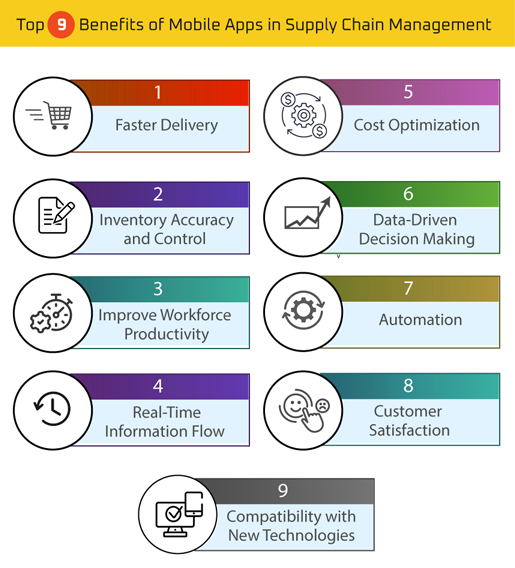Mobile Apps for Supply Chain Management: Usage and Benefits
As companies try to meet rising customer expectations, mobile apps are emerging as the best solution for businesses that are looking to improve the quality of their supply chain, bring in more agility and gain a cost advantage.
Mobile apps are transforming the supply chain processes. Mobile apps for supply chain management can help businesses provide world-class services to their customers and enhance their brand image. Many plug and play supply chain management (SCM) mobile apps like SAP Fiori and Oracle mobile apps available in the market can help you quickly leverage the power and convenience of managing the supply chain process at your fingertips.
Benefits of Mobile Apps in Supply Chain and Logistics
Supply chain apps have brought a range of benefits to businesses apart from optimizing their processes. Here are some of the key benefits delivered by supply chain mobile apps.

- Faster Delivery: We are living in the age of same-day delivery. According to a global survey by PwC, 88% of consumers are willing to pay more price for same-day or a quicker delivery. It is no surprise that most of the businesses are rethinking their supply chain to offer same-day delivery. Mobile apps can help businesses in preparing their supply chain for same-day delivery by empowering the employees with data on fingertips, real-time process visibility and collaboration.
- Inventory Accuracy and Control: Mobile technology and apps help businesses gain complete control over their inventories. It helps them minimize data entry errors with bar code scanning. Inventory accuracy is significantly improved with higher data accuracy and the ability to quickly identify inaccuracies. The benefits of improved inventory control include better supply chain planning and higher customer satisfaction through higher fulfillment and on-time deliveries. Mobile apps help warehouse personnel to access the product location with ease and accuracy. Apps can even be integrated with production resource tools such as forklifts.
- Improve Workforce Productivity: Mobile applications for the supply chain facilitate simplified and accelerated data entry, provide workers with real-time information on their hand and minimize their travel time which drives their productivity. Workers may perform many of their tasks from anywhere. Mobile apps also allow mangers to relay information in real-time which helps workers optimally schedule their activities. Workers can be trained anywhere, anytime by using mobile apps which can further enhance their skill sets and drive their productivity. The workflow/approval process becomes very quick as mobile apps can be integrated into any kind of business system. They also help reduce paperwork with digital signature functionalities.
- Real-Time Information Flow: Mobile apps for the supply chain process facilitate real-time information flow across the supply chain including inventory status, goods tracking, driver scheduling, inspection, etc. These apps provide all stakeholders like workers, managers, vendors, and customers with anytime access to the information. The real-time information flow strengthens collaboration across the processes, enables more accurate processing of customer orders, better scheduling of supply chain activities, and guaranteed deliveries. Various vehicle management and tracking applications can also be integrated or managed with mobile apps. Mobile apps also help in the quick resolution of issues.
- Cost Optimization: One of the key factors driving the usage of mobile apps in supply chain and logistics operations is the cost advantage it brings helping businesses remain competitive. From going paperless, driving workforce productivity, optimizing delivery routes to resource optimization, mobile devices and apps give higher value to the dollar spent.
- Data-Driven Decision Making: By providing real-time information anytime, anywhere mobile apps help every stakeholder in the supply chain process take data-driven decisions and eliminates the guesswork. Mobile apps are able to collect a lot of data, which can then be processed using advanced data technologies that can deliver actionable insights to the businesses. This makes forecasting accurate with advanced material requirement planning tools, which can further be integrated with AI-based technologies.
- Automation: Mobile technology and apps can be a great enabler to automation in the supply chain process making it lean and rapid. Data capturing through scanners helps in fast and accurate data entry as well as real-time information update across the chain. There are many companies that are using mobile apps and other advanced technologies to automate the monitoring of assets, fleet and goods.
- Customer Satisfaction: Mobile apps for the supply chain can also help businesses in enhancing customer services and satisfaction. Apart from helping businesses deliver products on time, customer apps can be built for order bookings, shipment tracking and customer support.
- Compatibility with New Technologies: With technological advancements, a lot many new technologies like blockchain, AI, IoT and robotics, etc., are being adopted in the supply chain management process. Mobile apps can integrate with all these new technologies and can add far greater value in improving the quality of the process.
At Gemini Consulting & Services, we work with businesses looking to build mobile apps for supply chain and logistics operations. Our expert mobile app development team can help you build custom apps as per your specific business needs. We can also help you in enhancing the features of your existing supply chain app. To know more, contact us.


